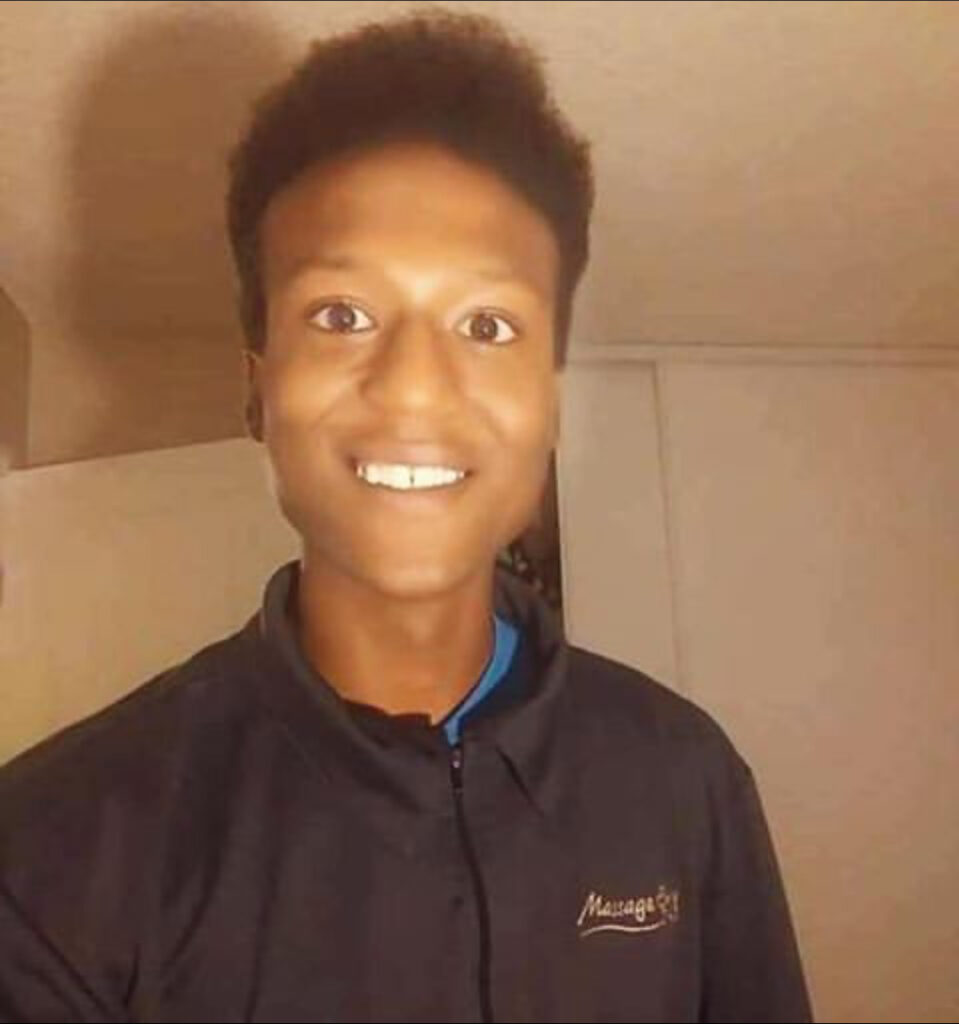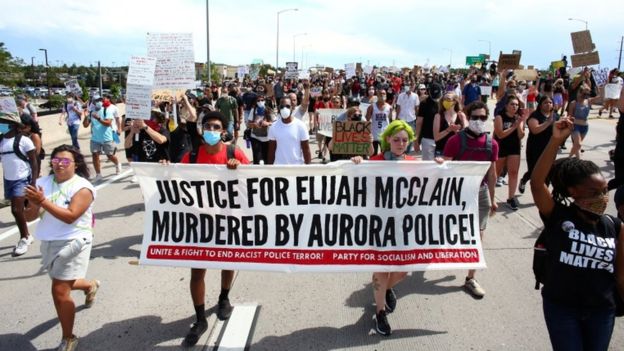ELIJAH MCCLAIN
On August 24, 2019, Elijah McClain was stopped by three White officers as he walked home from a convenience store, after a male 911 caller described a “suspicious person”. The caller described a Black male, saying he “looked sketchy” and was wearing a ski mask and waving his arms.
Elijah McClain was detained on his way home from picking up an iced tea for his brother.

According to McClain’s family, the 23-year-old had made a quick trip to the convenience store to pick up an iced tea for his brother. His sister later told a local ABC affiliate, Denver7, that McClain was wearing an open-face ski mask because he “had anemia and would sometimes get cold.” He was unarmed, simply walking home and, his sister said, and listening to music.

Aurora, Colorado police say Elijah resisted officer contact, according to their report, and a struggle ensued. On one of the officers’ body cameras, McClain is heard saying, “I’m an introvert, please respect the boundaries that I am speaking.” Body cam video shows McClain telling officers that he was trying to stop his music to listen to them, then they begin to arrest him.
One officer is heard telling another, “He just grabbed your gun, dude.” The video shows an officer wrestle Elijah to the ground. At one point during the struggle, an officer is heard telling Elijah, “If you keep messing around, I’m going to bring my dog out and he’s going to dog bite you.” An officer placed McClain in a carotid hold, or chokehold, and he briefly lost consciousness, according to the police report of the incident. They released the hold, the report says, and he began struggling again.
When paramedics arrived at the scene they administered ketamine to sedate McClain, the report said. According to a letter from the district attorney, McClain suffered a heart attack while in the ambulance, and he was declared brain dead three days later.
Elijah’s family have confirmed that he was taken off life support on August 30, 2019. His family said at the time that he was brain dead, and covered in bruises.
An autopsy did not determine a cause of death but listed intense physical exertion and a narrow left coronary artery as contributing factors, according to the police overview. The coroner found the amount of ketamine in his system to be a therapeutic amount.
The Adams County district attorney, Dave Young, declined to file criminal charges in the case at the time.
In February 2020, a police review board declared, “[t]he force applied during the altercation to include the carotid control hold and the force applied during the altercation was within policy and consistent with training.” The officers in the case were placed on administrative leave following McClain’s death, but were later reinstated after prosecutors declined to file charges against them.
Fast forward to 2020, when investigations commence into the 2019 death of Elijah following social media outcry and a petition signed by more than 2 million people. Elijah McClain’s death is one of several cases to receive renewed scrutiny following the state sanctioned murders of George Floyd, Breonna Taylor, and others in incidents sparking massive protests across the USA and the world.
Who was Elijah McClain?
Mr. McClain worked as a massage therapist, and taught himself to play both the guitar and the violin. According to the Sentinel, he often spent his lunch breaks at local animal shelters, putting on concerts for cats and dogs because he believed music would help soothe their anxiety. Those who knew him describe him as gentle: “I don’t even think he would set a mouse trap if there was a rodent problem,” his friend, Eric Behrens, told the Sentinel.

He often developed friendships with his massage clients, like April Young, who told the Sentinel: “He had a child-like spirit … He lived in his own little world. He was never into, like, fitting in. He just was who he was.”

“He was the sweetest, purest person I have ever met,” another of his friends and former clients, Marna Arnett, added. “He was definitely a light in a whole lot of darkness.” Arnett believes that, in addition to helping manage a chronic chill that McClain attributed to his anemia, wearing a mask helped him manage his social anxiety. “He would hide behind that mask,” Arnett said. “It was protection for him, too. It made him more comfortable being in the outside world.”
Speaking to CBSN Denver, his mother, Sheneen McClain, described her son as incredibly determined. “I thank God that he was my son because just him being born brought life into my world, you know what I mean?” she said. “I know he was giving life to other people too.”
How did he die?
An autopsy report by the Adams County coroner said that the cause of death was “undetermined,” and that it could have been a result of natural causes, a homicide related to the carotid hold, or an accident.
But while he was detained, Mr. McClain was clearly in distress. After officers restrained him on the ground, he vomited several times, for which he apologized, saying, “I’m sorry, I wasn’t trying to do that, I can’t breathe correctly.”
An officer said in the body camera footage [this footage is what the police have officially released to the YouTube Channel of Aurora Police] that officers had “put him out” with a carotid hold twice, “at least once successfully,” meaning Mr. McClain had lost consciousness.
When paramedics arrived, they gave him what was described by the Coroner as a “therapeutic” dose of ketamine; body camera footage shows that it made his body go limp when he was loaded onto a gurney.
The autopsy report, released in November 2019, said a combination of factors could have killed Mr. McClain.
Mr. McClain was “violently struggling with officers, who were attempting to restrain him,” the Coroner’s report read, this information likely having been taken from the police report, since the Coroner was not present at Elijah’s arrest. “Most likely the decedent’s physical exertion contributed to death. It is unclear if the officers’ actions contributed as well.”
In the report, it was also noted that Mr. McClain had chronic asthma.
In response to the autopsy report, Mari Newman, the lawyer representing Mr. McClain’s family, told Denver7 ABC,
“Whatever the report says, it’s clear that if the police had not attacked Elijah McClain, he would be alive today.”
“They immediately went hands on and tackled him,” she said.
“And of course the fact that all three of their body cameras fell off is something that we should all be pretty suspicious about. It makes it awfully easy for them to say whatever they want, but what we know is that they attacked him for no reason whatsoever. It was excessive force and it led to his death.”

What does the body camera footage show?
Body-camera footage of the arrest did not come out for months.
Body camera footage, released three months after Mr. McClain’s death, shows three officers — identified by the Aurora authorities as Nathan Woodyard, Jason Rosenblatt and Randy Roedema — arriving at the scene at around 10:30 p.m.
One officer approached Mr. McClain, who was listening to music, and told him to stop walking. Mr. McClain stopped after several commands but said he had a right to continue toward home.
According to the camera footage, the officer responded, saying he had a right to stop Mr. McClain for looking suspicious, and grabbed him by the arms. As another officer approached, Mr. McClain can be heard saying, “I am an introvert, please respect the boundaries that I am speaking. Leave me alone.”
Though Mr. McClain had not committed a crime, officers immediately restrained him, telling him to stop resisting when he put his arms up to his chest and to “stop tensing up.” The footage shows Mr. McClain pleading with the officers to let go of him, and trying to get out of their grip.
The officers eventually brought him to the ground, claiming he had reached for one of their guns while they were pinning him against a wall to handcuff him. The body camera footage does not show this, officers said, because their cameras had fallen off into the grass.
At one point, an officer tells Mr. McClain that he would use his dog on him if he did not “stop messing around.”
Very little of the officers’ protocol can be seen, however, because all of their body cams allegedly fell off during the arrest. But if you watch the video from about the 15-minute mark (warning: the footage contains violent and upsetting content), you’ll see someone pick up the body camera and point it toward McClain and one of the officers, before dropping it back into the grass. Around 15:34, one of the officers seems to say, “Leave your camera there.”
More officers arrived after Mr. McClain was restrained. While talking with one another, officers said that Mr. McClain was “acting crazy,” that he was “definitely on something,” and that he had attacked officers when they tried to restrain him. They also said he had “incredible, crazy strength,” and that at one point three officers were on top of him.
The autopsy report notes that Mr. McClain was 5 feet 6 inches and weighed 140 pounds.
What has happened since the officers concerned were reinstated?
The decision angered Mr. McClain’s family, and this spring, his mother pushed lawmakers to adopt police reforms. As the case garnered more attention in the weeks following the killing of Mr. Floyd by the police, Vanessa Wilson, the interim chief of the Aurora Police Department, announced a ban on carotid holds, like the one used on Mr. McClain.

Officers are also now required to report excessive force used by their colleagues, and to announce their intention to use deadly force before firing their weapon.
On June 25, 2020, Governor Jared Polis of Colorado signed an executive order appointing the state’s attorney general, Phil Weiser, to re-examine the case and file charges if the facts support prosecution.
“Elijah McClain should be alive today,” Mr. Polis said in a statement, “and we owe it to his family to take this step and elevate the pursuit of justice in his name to a statewide concern.”
On August 11, 2020, Mr. McClain’s family filed a lawsuit against the city of Aurora. The civil complaint, filed in the U.S. District Court by Mr. McClain’s parents, Sheneen McClain and Lawayne Mosley, seeks damages for the family and names the city, 12 police officers, two fire department paramedics and the department’s medical director as defendants.
“In a span of 18 minutes, defendants subjected Elijah to a procession of needless and brutal force techniques and unnecessary, recklessly administered medication, the combined effects of which he could not survive,” the lawsuit said.
That same day, it was announced that there would be a sweeping investigation into whether the Aurora Police Department has employed “patterns and practices” that may deprive people of their constitutional rights. The investigation will be a broad look at the police department’s record of arrests, stops, searches and use of force.

There are now five separate investigations into the Aurora Police Department and the death of 23-year-old Elijah McClain.
Federal
WHO: The local Federal Bureau of Investigation, the U.S. Attorney’s Office and the U.S. Department of Justice
WHAT: The feds are probing whether officers violated McClain’s civil rights under a federal law that prohibits on-duty law enforcement officers from depriving people of their civil liberties.
CONSEQUENCES: The officers involved in McClain’s arrest could be indicted by a grand jury for violating Section 242 of this code — though the bar is high. The feds must prove the officers willfully stripped McClain of his rights, or willfully used excessive force against a non-violent person.
TIMELINE: Ongoing
State, McClain
WHO: This investigation is being led by state Attorney General Phil Weiser after Gov. Jared Polis issued an executive order asking for an independent investigation into McClain’s death.
WHAT: The executive order specifically asks Weiser to investigate the case and, if the facts support it, criminally prosecute any individuals (cops and paramedics) whose actions allegedly caused McClain’s death.
CONSEQUENCES: Despite being initially cleared by Adams County District Attorney Dave Young, several cops could face state criminal charges in McClain’s death. A complicating factor in this, however, is that in McClain’s autopsy, his cause and manner of death were “undetermined.” Because there is no homicide determination, it could be difficult to find any cops criminally liable for his death.
Timeline: Ongoing
State, Police Department
WHO: Weiser announced in August that he has launched a probe into patterns and practices at the Aurora Police Department.
WHAT: This investigation, completely separate from Weiser’s other investigation specifically into McClain’s death, will broadly probe the Aurora Police Department. Weiser will look at whether officers have systemic problems and practices that violate people’s civil rights under state and federal law. The state’s office of the attorney general was granted this authority under SB-217 — which was signed into law by Gov. Jared Polis in June. It is similar to existing power at the federal level under the U.S. Department of Justice.
CONSEQUENCES: If Weiser’s office finds a troublesome practice or pattern at the Aurora Police Department, he could enter into an agreement with it that would require a specific remedy, like more training or more monitoring, for example.
TIMELINE: Ongoing
City, McClain
WHO: The city of Aurora has hired Jonathan Smith, a Washington, D.C.-based lawyer, to look into how city officials, both police and paramedics, handled Elijah McClain’s arrest, including the fact that he was involuntarily administered ketamine.
WHAT: Smith’s work is just getting started, but his three-person team will look into whether cops and paramedics involved in attempting to arrest McClain broke department rules during the incident and whether there are better practices or rules to put in place.
CONSEQUENCES: Smith and members of the city council say that depending on the results of the investigation, there will likely be suggestions for changes to police and paramedic training guidelines and policies. This could include the use of ketamine in pre-hospital settings. The recommendations could be a step toward larger reform in the police department.
TIMELINE: Ongoing
City, Police Department
WHO: The city has hired 21CP Solutions to conduct a department-wide review of Aurora Police Department’s practices.
WHAT: The review will look at Aurora police’s use of force, potential discriminatory practices, community engagement, civilian complaints, recruitment and hiring, crisis intervention interactions and interaction with vulnerable populations, as well as officer misconduct.
CONSEQUENCES: City Manager Jim Twombly said the review will create a “reform” agenda for potential changes within the department.
TIMELINE: Ongoing
One of the officers involved has been fired — in connection with an inappropriate photo.
On July 3, interim police chief Wilson announced that she had fired Rosenblatt and two other officers over their connection to photos taken at a memorial for McClain last October. Another officer, Jaron Jones, resigned on Tuesday.
In the images, Jones poses with his arm wrapped around officer Kyle Dittrich’s neck, a mocking imitation of the hold used on McClain. Both officers are smiling, while officer Erica Marrero grins over their shoulders. Rosenblatt did not participate in the photograph, but he did text back “haha” when someone sent it to him, according to the New York Times. On July 3, Wilson said that Rosenblatt was “being fired for his … utter inability to do the right thing here.” Wilson noted that Woodyard also received the pictures, felt “extremely disturbed,” and deleted them.
As for Dittrich and Marrero, Wilson added: “To even think about doing such a thing, it’s beyond comprehension, and it’s reprehensible. It shows a lack of moral values and integrity.”
“We know that there are cops that have integrity. They understand duty and they understand honor. These four don’t get it,” Wilson said. “They don’t deserve to wear badges anymore.”
Addressing the photos at a news conference, Newman, the McClain family’s attorney, drew a parallel “with the Jim Crow South, where white supremacists thought it was amusing to take pictures of themselves with lynched human beings.”
On September 3, 2020, tennis star Naomi Osaka arrived at Arthur Ashe Stadium and took part in her pre-match warm-up and events while wearing an Elijah McClain mask. Big up, Naomi!

Sources: CNN, CPR, The NY Times, The Cut, BBC, Instagram.




